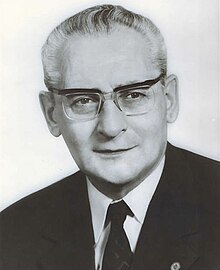Paul Verner

Paul Verner (26 April 1911 – 12 December 1986[1]) was a German communist politician. He joined the communist movement at a young age and went into exile during Hitler's rule. Verner became a prominent political personality in the German Democratic Republic after the war.
Early life
Verner was born in Chemnitz in 1911. His father was a metal worker while his mother worked as a textile worker. Verner trained as metal worker like his father. At an early age, Verner joined the communist children's organization Jungspartakusbund (Young Spartacus League).[1][2]
Political activism
In 1925 he joined the Young Communist League of Germany (KJVD). In 1929 he became a member of the Communist Party of Germany (KPD). He worked as a volunteer in the communist publishing house Kämpfer-Verlag in Chemnitz. He became a member of the regional leadership of KJVD in Saxony. In 1932 he became editor of Junge Garde ('Young Guard').[1]
In exile
With the National Socialist takeover in Germany, Verner went into exile. Towards the end of 1933, he became a member of the Scandinavian Bureau of the Young Communist International, and edited Jugendinternationale (the German-language publication of the Young Communist International). In 1934 he shifted to Paris, where he became editor-in-chief of Junge Garde (now published in exile), a position he held until the spring of 1935. He moved to Belgium, as the KJVD reorganized.[1]
Verner fought as a volunteer in the International Brigades in the Spanish Civil War.[2] After the Spanish Civil War, he emigrated to Sweden.[2] He was detained by Swedish authorities in Smedsbo, Värmland, between March 1940 and 1942. After being released from Smedsbo he began working as a metal worker in Sweden from August 1943.[1]
Political career in the GDR
After the end of the Second World War, he returned to Germany. During 1946 he was a co-founder, together with Hermann Axen and Erich Honecker, of the Free German Youth ("Freie Deutsche Jugend" / FDJ),[1][2]
In 1958 Verner became a candidate member of the Socialist Unity Party of Germany (SED) politburo.[1] He was also one of the secretaries of the party Central Committee. In March 1959 Verner became First Secretary of the Berlin district organization of SED, a powerful institution in the GDR. At the time the party district included West Berlin. Verner received criticism for the dismal performance of the party in West Berlin. Under Verner's leadership the West Berlin organizations were separated from the SED in 1961 (and would become the Socialist Unity Party of West Berlin).[2]
Verner became a full Politburo member in 1963.[3] For most of the 1970s and early 1980s, he was the second-ranking member of the SED hierarchy, and de facto the second most powerful man in the country after party leader Erich Honecker.
He died in Berlin in 1986.
References
- ^ a b c d e f g Michael F. Scholz. "Verner, Paul * 26.4.1911, † 12.12.1986 Mitglied des Politbüros des ZK der SED, 1. Sekretär der Bezirksleitung Berlin der SED". "Wer war wer in der DDR?". Ch. Links Verlag, Berlin & Bundesstiftung zur Aufarbeitung der SED-Diktatur, Berlin. Retrieved 6 July 2018.
- ^ a b c d e The Sed Leadership after the Sixth Party Congress (III) Archived 2011-07-17 at the Wayback Machine
- ^ The Sed Leadership After the Sixth Party Congress[permanent dead link]
- 1911 births
- 1986 deaths
- People from Chemnitz
- People from the Kingdom of Saxony
- Communist Party of Germany politicians
- Members of the Politburo of the Central Committee of the Socialist Unity Party of Germany
- Members of the State Council of the German Democratic Republic
- Members of the 3rd Volkskammer
- Members of the 4th Volkskammer
- Members of the 5th Volkskammer
- Members of the 6th Volkskammer
- Members of the 7th Volkskammer
- Members of the 8th Volkskammer
- Members of the 9th Volkskammer
- Free German Youth members
- German people of the Spanish Civil War
- International Brigades personnel
- Recipients of the Order of Karl Marx
- Recipients of the Patriotic Order of Merit (honor clasp)
- Recipients of the Star of People's Friendship
